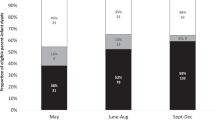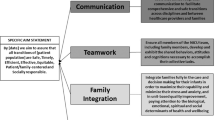Abstract
Objective: Evaluation. Contrary to the Anglo-American region, very little is known in Germany on the structure and organisation of nutrition support teams (NST).
Design: Prospective investigation of the structure and organisation of German NST, using standardised interview questionnaires.
Settings: Hospitals with more than 250 beds in Germany.
Subjects: German NST (n=47).
Interventions: Face-to-face interview in 1999, using a standardised questionnaire.
Results: From a total of 2000 German hospitals, NST have been established at 47 hospitals (2.3%). Most NST are affiliated to a large university hospital or an academic teaching hospital. In general, the NST are not independently operating units but are affiliated to a special discipline, and were in operation for an average of 8 y. The NST cared for a median of 65 outpatients annually. At the university hospitals in average, 477 in-patients were treated per year, at the teaching hospitals 400 and at all other hospitals 179. The work of the NST centred on enteral nutrition. A total of 47% of the physicians, 19% of the nurses and 19% of the dietitians in the NST held a nutrition-specific additional qualification. A total of 2% of the physicians, 68% of the nurses and 77% of the dietitians are exclusively responsible for the NST. More than 70% of the financing of the personnel was secured through third-party funds.
Conclusion: In Germany, neither uniform nor comprehensive patient care by NST existed in 1999. More than 50% of all NST members do not hold a nutrition-specific additional qualification. Frequently, besides their tasks in the team, the NST staff also carries out other clinical functions. Contrary to the American NST, the German NST are not interdisciplinary operating units but are primarily financed through third-party funds of the industry.
This is a preview of subscription content, access via your institution
Access options
Subscribe to this journal
Receive 12 print issues and online access
$259.00 per year
only $21.58 per issue
Buy this article
- Purchase on Springer Link
- Instant access to full article PDF
Prices may be subject to local taxes which are calculated during checkout




Similar content being viewed by others
References
Allison SP (2001): Nutrition support teams: dissociated ions or the yeast in the loaf? Clin. Nutr. 20, 289.
Ashley C & Howard L (2000): Evidence base for specialized nutrition support. Nutr. Rev. 58, 282–289.
Brown RO, Carlson SD, Cowan GSM et al. (1987): Enteral nutrition support management in a university hospital: team vs non-team. J. Parent. Ent. Nutr. 11, 52–56.
Cohen IL (1993): Establishing and justifying specialized teams in intensive care units for nutrition, ventilator management, and palliative care. Crit. Care Clin. 9, 511–520.
Elia M (1993): Artificial nutritional support in clinical practice in Britain. J. R. Coll. Phys. London 27, 8–15.
Hassel JT, Games AD, Shaffer B & Harkins LE (1994): Nutrition support team management of enterally fed patients in a community hospital is cost-beneficial. J. Am. Diet. Assoc. 94, 993–998.
Howard JP, Bruce J & Powell-Tuck J (1997): Nutritional support: a course for developing multidisciplinary clinical teams. Education Committee, British Association for Parenteral and Enteral Nutrition. J. R. Soc. Med. 90, 675–678.
Howard P (2001a): Organizational aspects of starting and running an effective nutritional support service. Clin. Nutr. 20, 367–374.
Howard P (2001b): Practical nutritional support: working together to make it happen. Proc. Nutr. Soc. 60, 415–418.
Howard L, Heaphey L, Fleming CR et al. (1991): Four years of North American Registry Home Parenteral Nutrition outcome data and their implications for patient management. J. Parent Ent. Nutr. 15, 384–393.
Jonkers C, Lochs H, Lerebours E, Meier R, Messing B & Soeters PB (1999): Survey to establish the current status of artificial nutritional support in Europe. Clin. Nutr. 18, 179–188.
Mughal M & Irving M (1986): Home parenteral nutrition in the United Kingdom and Ireland. Lancet ii, 383–387.
Payne-James J, de Gara C, Grimble G, Rees R, Bray J, Rana S, Cribb R, Frost P & Silk D (1990): Nutritional support in hospitals in the United Kingdom: national survey 1988. Health Trends 22, 9–13.
Regenstein M (1991): Nutritional support teams—alive, well, and still growing. Nutr. Clin. Pract. 7, 296–301.
Roberts MF & Levine GM (1992). Nutritional support team recommendations can reduce hospital costs. Nutr. Clin. Pract. 7, 227–230.
Sousa AM (1994): Benefits of dietitian home visits. J. Am. Diet. Assoc. 94, 1149–1151.
Suchner U, Dormann A, Hund-Wissner E, Shang E & Senkal M (2000): Requirement for the structure and function of a nutritional support team. Anaesthesist 49, 675–684.
Author information
Authors and Affiliations
Contributions
Guarantor: E Shang.
Corresponding author
Rights and permissions
About this article
Cite this article
Shang, E., Suchner, U., Dormann, A. et al. Structure and organisation of 47 nutrition support teams in Germany: a prospective investigation in 2000 German hospitals in 1999. Eur J Clin Nutr 57, 1311–1316 (2003). https://doi.org/10.1038/sj.ejcn.1601693
Received:
Revised:
Accepted:
Published:
Issue Date:
DOI: https://doi.org/10.1038/sj.ejcn.1601693



